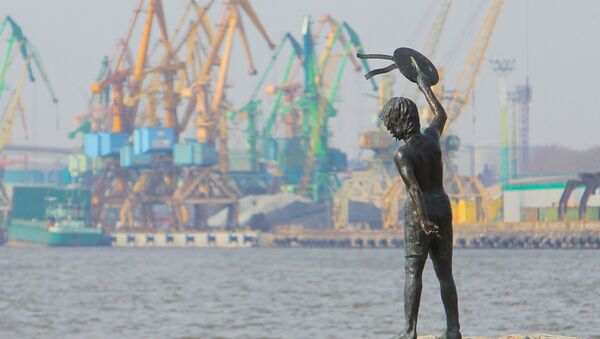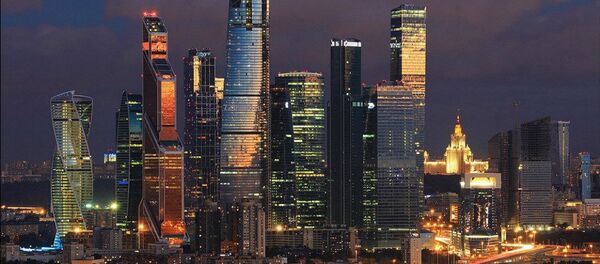The situation, Russian news journal PolitRussia explains, is also leading to a catastrophic situation for the countries' national railway companies.
Estonian Railways has been hit especially hard, and is looking in Moscow's direction to "resolve the problem" of low cargo traffic. A delegation from the railway company, including company director Sulev Loo, went to Moscow last week following Russia's announcement that it would halve rail transport into the country, from twelve to six trains per day. The answer they got is that the demand just isn't there.
Russian Railways explained (in an official letter sent to its Estonian counterparts) that the decline in traffic comes down to a drop in orders to ship to Estonian ports. The Russian side, the company emphasized, "did not impose any restrictions on the movement of trains, or applications for the transport of goods to/through Estonia."
Last week, Estonian Railways director Loo confirmed that his sector faces catastrophic losses. "We are engaged in a dialogue with Russia in order to understand what can be expected of us." Otherwise, he suggested, "everything could come crashing down to nil."
In 2015, the tonnage transported by Estonian Railways declined to historic lows, to 28 million tons' worth of cargo – 23% less than in 2014.
At the same time, PolitRussia recalled, "the situation is even worse in Baltic ports. Last year saw a decline in economic performance for a vast majority of them."
"It's simple," the news and analysis website explained. "The countries' ports, built during Soviet times, traditionally lived off of cargoes, first those coming from the rest of the Soviet Union, and then from Russia." Worsening relations with Russia resulted in decline for them, particularly over the last two years. In 2015 alone, the volume of goods headed to or from Russia through Baltic countries' ports declined between 15-20%.
Earlier this year, Latvian business newspaper Dienas bizness calculated that the decline has been a long time coming; between 2005 and 2015, it explained, cargo turnover at ports in the eastern Baltic grew by a total of 39%, from 265 to 368 million tons. At the same time, the share of Russian ports among this activity grew from 52 to 62% of the total. In 2015, compared to the previous years, Russian ports along the Baltics increased their transit of coal by 9% (to 23.2 million tons), the shipment of oil products by 3.9% (to 2.5 million tons), and the shipment of mineral fertilizers by 17% (1.5 million tons), while their Baltic country competitors faced a decline.
The trend, Dienas bizness suggested, will only get worse, with Russian companies reducing transit to unfriendly countries, transferring it to their own infrastructure, and thus providing Russian transport workers more work.
PolitRussia recalled that Russia's initiatives to increase its transit independence are state policy, reiterated by President Vladimir Putin last year in his address to the Federal Assembly.
"We will continue to upgrade our transport infrastructure and expand major logistic centers such as the Azov-Black Sea and Murmansk transport hubs, modern ports in the Baltic Sea and the Russian Far East," Putin said.
According to officials from the Russian transport ministry, the last five years have seen yearly growth in capacity of an average of 20 tons per year among the country's ports, with 2016 capacity expected to grow by another 32 million tons.
Last year, total turnover at the Ust-Luga port grew to 75.6 million tons, the highest figure in the Baltic region. The ultimate goal is to grow it to 170-180 million tons per year, most of it transit redirected from the Baltic states.
"For the economies of the Baltic, this maneuver will hit hard," PolitRussia notes. "In Latvia, for example, transit accounts for 12-13% of the country's GDP, with 80% of it transit of cargo coming from the east. The Ministry of Transport has already calculated the material losses in case of the loss of Russian transit, with the Latvian budget losing 1.6 billion euros."
At the same time, the online paper notes, only manufacturers and financiers seem worried. "The political elite in Latvia, Estonia and Lithuania continues to enthusiastically saw away at the tree branch they're sitting on, choking from their own Russophobia. For them, the ports and railways are, in the first place, a 'legacy of occupation', and secondly, pose a risk of an 'economic fifth column'. And it really is frightening that such large numbers of workers have a vested interest in constructive and mutually beneficial relations with Russia."
Last year, Russia committed nearly 28 billion rubles (about $426 million US) to improving port infrastructure. "A large part of this money," PolitRussia writes, "could have gone to the Baltic countries, were they to keep up normal business relations with Russia. But it was not to be; the desire to curry favor with the West, and the Russophobia nurtured over many years, has led to multimillion dollar losses. Russia has learned to penalize Russophobia through the ruble."
Working people in the Baltics, PolitRussia notes, now face the consequences "for entrusting their fates to Washington's protégés, for agreeing to see their countries become second-class entities in the EU, for allowing NATO weaponry to overrun their countries, and for forgetting that when you become a bridgehead for the aggressive plans of others, you can also become the first target for retaliation," in this case economic.






